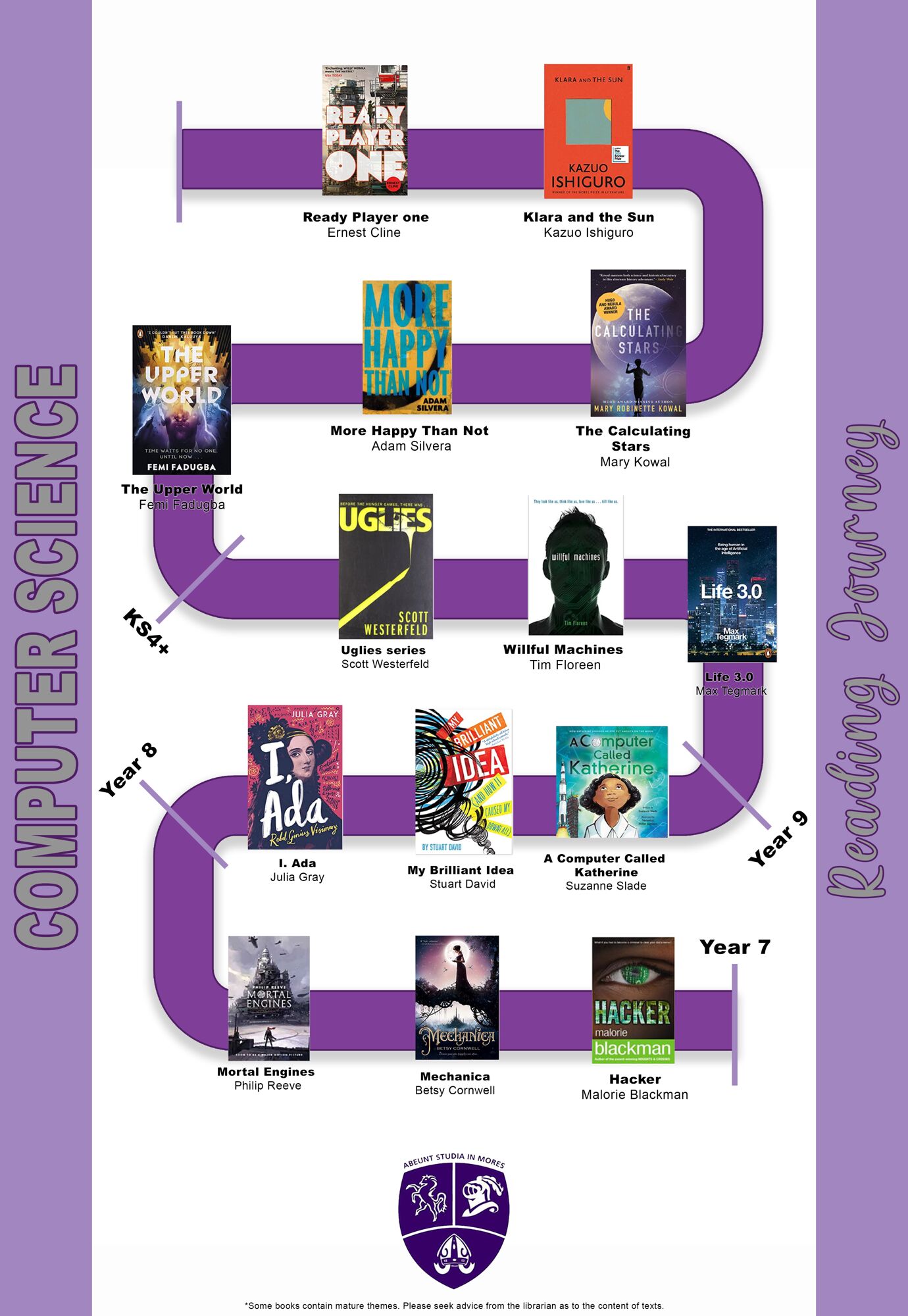- Home
- Academic Excellence
- Subject Information
- Computer Science
Computer Science

Curriculum Vision
In the Computer Science Department, we believe in developing student’s problem solving, and creativity skills in this challenging subject. Our students will learn about computer fundamentals with topics such as binary, hardware and software, computational thinking, artificial intelligence and programming using textual languages.
Learning is not just confined to the classroom. We offer a range of stimulating extra-curricular enrichment opportunities, with Key Stage 3 Computer Science Club running alongside our stretch and challenge groups for GCSE and A Level. We also partake in numerous competitions and have students entered into the semi-finals of the AWS Amazon app competition, alongside students who have progressed to the later rounds of the Astro-Pi Space Mission programme. Our aim is to support students to be logical, inquisitive and creative thinkers able to work with others and independently to solve real time challenges.
Curriculum Learning Journey
Learning is not just confined to the classroom. We offer a range of stimulating extra-curricular enrichment opportunities, with Key Stage 3 Computer Science Club running alongside our stretch and challenge groups for GCSE and A Level. We also partake in numerous competitions and have students entered into the semi-finals of the AWS Amazon app competition, alongside students who have progressed to the later rounds of the Astro-Pi Space Mission programme. Our aim is to support students to be logical, inquisitive and creative thinkers able to work with others and independently to solve real time challenges.
Curriculum Reading Journey

Summary of Study at each Key Stage
Key Stage 3
Our Key Stage 3 curriculum has been designed by our expert staff to be challenging and appropriate in order to equip students to use computational thinking and creativity to understand and change the world. Computing has links with mathematics, science and design and technology, so our curriculum aims to ensure insights into both natural and artificial systems.
Through Years 7 to 9, we follow the National Curriculum where students;
- Can understand and apply the fundamental principles and concepts of computer science, including abstraction, logic, algorithms and data representation
- Can analyse problems in computational terms, and have repeated practical experience of writing computer programs in order to solve such problems
- Can evaluate and apply information technology, including new or unfamiliar technologies, analytically to solve problems
- Are responsible, competent, confident and creative users of information and communication technology
Year 7
- During a weekly 1 hour lesson, students are able to learn an excellent balance of digital literacy and computing skills, necessary to build confidence and form a solid foundation for further development in the years to follow in Key Stage 3.
- Starting the year with the important topic of e-safety; incorporating cyberbullying, online safety and computer protection.
- Understanding the use of software, including operating systems.
- Immersion in the history of computing, from Babbage, Lovelace, Pascal, Boole and Turing to the introduction of the Processor, to gain an appreciation of how technology works today.
- An introduction to computer programming constructs using the language Small Basic.
- The growing importance of data science is introduced with the topics of Big Data and pattern modelling systems, along with an introduction to Structured Query Language.
- An exploration into computational ethical, social and moral issues.
Link to Year 7 Topic by Topic Overview: N:\Faculties\Computer Science\9_Computing Booklets\Year 7\Retrieval Practice Pages\Yr 7 Computing KO
Year 8
- Students continue to build on their computing and digital literacy skills with the units of work taught below. Concepts and skills are designed to stretch all abilities during a 1 hour lesson a week, where their knowledge and skills are reinforced and developed further with the projects taught below.
- An introduction to Artificial Intelligence – including how an artificial neural network works, to ethics, training bias and thinking machines.
- Design and develop webpages, using HTML5, CSS and JavaScript.
- Finding out what algorithms are, how to read and write them alongside the use of searching and sorting algorithms, such as Bubble Sort.
- Exploring Cryptography and producing codebreaking mathematical models
- Computer Systems Architecture, in order to gain the knowledge for data representation and the parts that make up a computer. Students will build their own computer in this module, as well as learn how to convert binary into denary and the use of logic gate theory.
- Introduction to Computer Aided Design, using CAD software
Link to Year 8 Topic by Topic Overview: N:\Faculties\Computer Science\9_Computing Booklets\Year 8\Retrieval Practice Pages\Yr 8 Computing KO
Year 9:
- Computer Science is a specialist subject at CSGS, so Year 9 is used to prepare the students for when they choose their options, on whether to choose GCSE Computer Science, which is offered as a full course GCSE option.
- An Introduction to Boolean and Binary Logic and how this is used in processor architecture.
- Programming using the Python programming language, to enhance concepts that include sequencing, selection and iteration.
- Networking and the difference between the Internet and the World Wide Web; looking at light/electricity, packet switching and layering.
- Computational thinking skills; how the use of abstraction, decomposition and pattern recognition helps to build more efficient programs.
- Creating Android apps using the JavaScript programming language, which helps to develop students’ design and programming skills further and helps them produce a solution that they will be proud of.
Link to Year 9 Topic by Topic Overview: N:\Faculties\Computer Science\9_Computing Booklets\Year 9\Retrieval Practice Pages\Yr 9 Computing KO
Key Stage 4
Why Choose Computer Science?
There are various reasons to study Computer Science, but the main reason is that it is guaranteed to equip students with valuable skills and knowledge for a solid foundation, for any career they wish to pursue in the future. These skills can also be developed further at higher education and for a future career in the industry to work with variety of technologies, such as web design and games development. The Key Stage 3 curriculum prepares students for the demands of the GCSE syllabus, where the Computer Science course is offered at GCSE.
OCR GCSE Computer Science
Students will have experienced some theoretical knowledge of computer systems and basic programming through their Computing Science lessons at Key Stage 3. This course is challenging yet it offers an interesting way to develop skills, which can be transferred to other subjects and applied in day-to-day life.
Students are helped to improve analysis and problem-solving skills through the study of computer programming and computational thinking in the form of abstraction and decomposition.
The course provides excellent preparation for study in higher education and employment in the field of Computer Science that rely on these skills, especially where they are applied to technical problems. Careers include engineering, financial, science and medicine.
Further information on the course: OCR GCSE Computer Science –
GCSE - Computer Science (9-1) - J277 (from 2020) - OCR
Key Stage 5
A Level Computer Science
A Level Computer Science is increasingly becoming more and more valued by universities and employers since the content has been updated to include the development of analytical thinking, mathematics and problem-solving skills. The course therefore, can provide excellent preparation for the study of Computer Science at undergraduate level and for the Computing element of Mathematical, Engineering and Scientific degrees. Students who choose the qualification have an interest in programming and problem-solving, gain most from the course.
The department uses the OCR A Level in Computer Science due to its modern content and its academic rigour. Students will build on their GCSE qualification in Computer Science and learn additional concepts, such as a working understanding of object-oriented design techniques, abstract data types, computer hardware, database design using SQL and techniques used to represent data.
Students are assessed via a practical programming paper and two written theoretical papers and a programming project. A significant amount of time is therefore spent developing students programming and problem-solving skills over the duration of the course
Benefits of Studying the Linear Computer Science A Level – OCR
- If students want to go on to higher study and employment in the field of Computer Science, they will find that this course provides a superb stepping stone. Students who study Computer Science, can go on to a career in Medicine, Economics, Business, Politics or any type of Science. However, we have also had students thrive alongside music technology, graphic design through Art and ethical considerations from Psychology.
- The course gives learners a real, in-depth understanding of how computer technology works and provides excellent preparation for higher study and employment in the field of Computer Science.
- We find that our students have ample opportunity to develop their critical thinking, analysis and problem-solving skills, through the study of computer programming
Further information on the course: OCR A Level Computer Science - https://www.ocr.org.uk/computer science
Opportunities Beyond the Classroom
Key Stage 3
Throughout the school year students are offered various opportunities in computing.
Friday After School Club in Room 10: Aimed at all students, the club explores different areas of computing, from coding to building computers using BBC Microbit and Robotics Kits.
Computing Activities; students are offered a range of activities that include working with physical computing, being introduced to the Java programming language or working with Kano kits.
STEM Lectures: Students have the opportunity to hear from industry leaders in Computer Science specific areas, about their careers in the technology industry.
TED Talks: TED talks are put on for students after school, to explore real world Computer Science problems.
Key Stage 4
Throughout the school year students are offered various opportunities that include tailor-made booster sessions to all abilities.
STEM Lectures: Students have the opportunity to hear from industry leaders in Computer Science specific areas, about their careers in the technology industry.
TED Talks: Regular TED talks are put on for students after school, to explore real world Computer Science problems.
After School Activities
There are computer suites available to GCSE students after school.
Key Stage 5
Sixth Form students are encouraged to get involved in promoting a love of all things computing, with the other year groups and take part in supporting pupils through mentoring, by visiting lessons in their free time and speaking directly with students and leading competitions from Astro-Pi Space Missions to Cyber Explorers, during lunchtime sessions.
In turn, Sixth Form students get to immerse themselves in the world of computer science through speaking to industry experts, attending “A Day in the life of…” sessions to explore different career paths and undertaking projects of their own ideas.